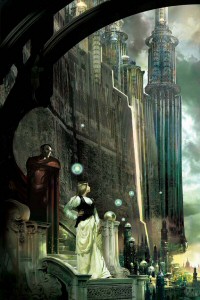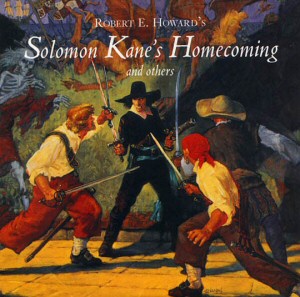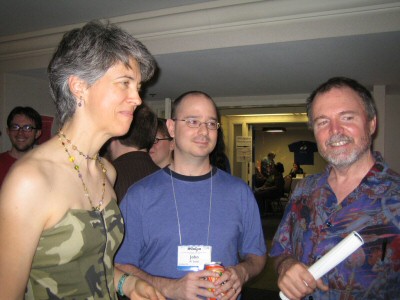 If you’ve read either his debut novel Elantris, or his sophomore effort Mistborn, you will definitely be interested in Brandon Sanderson’s website, since it includes detailed annotations for both books, along with a blog and lots of other stuff including info and exceprts from forthcoming works.
If you’ve read either his debut novel Elantris, or his sophomore effort Mistborn, you will definitely be interested in Brandon Sanderson’s website, since it includes detailed annotations for both books, along with a blog and lots of other stuff including info and exceprts from forthcoming works.
Here’s a link to a recent essay on why authors would prefer you to buy hardcover books, even if you only buy 1/3 as many (and make up the difference with the library).
![]()
 Blogcritics Magazine has an interview with Christopher Moore. He’s always worth a read. (Note to self: You Suck comes out today. Go buy it.) Here’s a bit from the interview:
Blogcritics Magazine has an interview with Christopher Moore. He’s always worth a read. (Note to self: You Suck comes out today. Go buy it.) Here’s a bit from the interview:
Not all of your books have been specifically horror, but all have had elements of the supernatural in them, or at least the surreal. What first attracted you to those themes, and what continues to keep them fresh for you?
Probably a short attention span. Reality gets pretty boring. I’ve tried to write stories without a supernatural element, but not far in I’m usually saying, “This guy is a dick, I need to feed him to a monster.” Then there you go.
![]()
 Collectors always have specific things that aren’t in their collection, that they are searching for. It took me a number of years to get good quality copies of the four hardcovers of Lieber‘s Lankhmar stories with Mike Mignola illustrations, that White Wolf published
Collectors always have specific things that aren’t in their collection, that they are searching for. It took me a number of years to get good quality copies of the four hardcovers of Lieber‘s Lankhmar stories with Mike Mignola illustrations, that White Wolf published
The only remaining thing that I am really bothered not to have (as opposed to things that nag at me mildly, like the need to own one of the extremely rare editions of Last Call) is Wandering Star‘s edition of Robert E. Howard’s Solomon Kane stories. Abe lists the cheapest copy of that at $1000. So, I want that book, but I don’t want it $1000. Hell, I didn’t want it $700 when it could be had for that. I’ll watch eBay, and live without it for now.
While the internets can’t bring me the book for a reasonable price, it can do something. It can bring me MP3s of the material that came on CD along with the Wandering Star printing. It’s a long way from having the book, but just listening to the reading of Solomon Kane’s Homecoming helps.
![]()
The last little while has seen publication dates announced for new novels from my friends-I-haven’t-seen-in-person-for-a-really-long-time, Will Shetterly and Emma Bull. They’re available for pre-order
I’ve mentioned Emma’s book here before, and I don’t need to place a pre-publication order
Will’s new book (which you could have read some drafts of online, just as you could be reading drafts of his next one online right now) is also available for ordering en advance, although I have one (or maybe two) copies of that already coming to me from them as well. I have fairly good reason to believe that this book will feature a dedication to my daughter, and prominent appearances by one of my associates…
Having fully disclosed my personal connections, I still heartily encourage you to buy both of these books, and as Mr. Sanderson suggests, buy them in hardback. If past performance is an indicator of current or future performance for authors, as it so patently is not for mutual funds, then both of these books are very safe bets to be excellent works.

![]()
Oh boy, is my wife going to be mad at John Crowley. He’s using his LJ to build a list of books that… well, I’ll let him explain:
In the coming semester (a few shudder-making days from now) I am going to teach a course in genre writing, F&SF. One of my contentions about fantasy novels, and science-fantasy and future-world novels too, is that the society of the disatant future, or an alien species, or another planet, or an alternate universe, ought to be at least as complex and unlikely-seeming (to Western European/American-culture-based writers in English) as the societies, mentalities and cultures that humans have in fact produced. So this year I am going to ask my students to read one book of travel, history, cultural anthropology, or similar account that will illustrate this contention, and shame them out of concocting another pseudo-medieval non-society peopled by folks like themselves (and a few dragons and vampires, also much like themselves).
Towards that end, he’s building a list, with recommendations of travel, history, cultural anthropology, etc, books.
You can see the first cut of the list 20 books here.
Here’s a sampling:
The Night Battles, Carlo Ginzburg. An alternative story of how witch and werewolf beliefs operated in medieval Italy.
The Art of Memory, Frances Yates. How a mnemonic mentioned in Latin and Greek rhetoric flowered into an impossibly vast magico-philosophic system in the Renaissance.
Women, Fire and Dangerous Things, George Lakoff. The way different cultures view the world as exemplified in their language. Don’t invent a language without it.
Castle and Cathedral, David Macauley. You probably read them as kids: books by a great draughtsman about the actual month-to-month and year-to-year building of these buildings. Let’s get our details right.
Why will this enrage my wife? Well, of the 20 books listed, I have exactly two (“Extraordinary Popular Delusions and the Madness of Crowds”, “The Serpent and the Rainbow”) but I need to read at least 16 of the others. And that means 16 new books coming into the house immediately, and probably a bunch more as knock-on effects.
I’ll have to get her reading Little, Big, so she will feel kindly disposed towards Crowley.
![]()
Do you know the Harlan Ellison story “Prince Myshkin, and Hold The Relish“? It’s been around for 25 years now, so the odds are you had a chance to see it if there was ever a chance you were going to.
Anyway, Ellison has always maintained that it was a story meant to be read aloud. He even made an audio version available to people who bought Jeffty Is Five from his Recording Collection. (It was also available in a different version on the Midnight In The Sunken Cathedral audio book, which was more widely available.)
Well, if you pop over to the Creative Differences website and click on the “Prince Myshkin” link
The story is pretty good, and the audio presentation is actually better for it than reading it. However, I kept getting thrown out of the story by the differences between how Harlan looks now, and how Harlan looks in my mind. I don’t want to say he looks like someone’s grandmother these days, because you never know, he might just mail me a dead gopher or something, but…
![]()
Rick Kleffel really wants to sell you a copy of Night Shade‘s new Clark Ashton Smith collection. He’s really, really happy with the first volume of the five volume series, and he will explain why in a way designed to make you want to buy one–if you’re at all in the target audience anyway.
His arguments don’t work on me, however, since I paid for all 5 volumes in early 2005. At the time the plan was “The first volume is due in the fall of 2005. After the first volume is released, we will no longer accept subscriptions. Vols. 2 & 3 are due in 2006, vol. 4 & 5 are due in 2007.” Obviously, the schedule has slipped a little bit. Oh well–I’d rather wait and get the excellent books that Night Shade normally produces, and if Rick’s review is anything to go by the annotations and back matter were also worth the wait.
And, my little neener-neener to other CAS fans who didn’t subscribe at the time is this: I get the extra book. The promotional material at the time described it as follows:
Most importantly, subscribers will receive an extra book, Tales of India and Irony, that will ONLY be available to subscribers. These are Smith’s non fantasy/science fiction/horror tales, and will not be part of the five volume set. Table of contents are posted on the website, but I can tell you that it includes an unpublished story, “The Animated Sword.”


10 comments for “A Tuesday bookish miscellany”